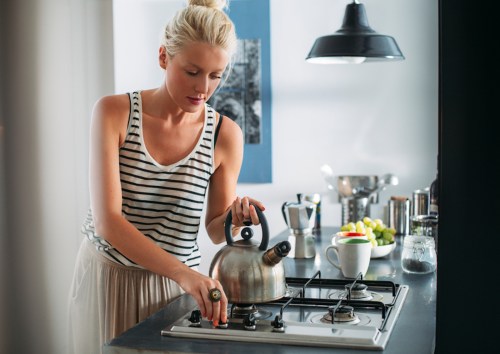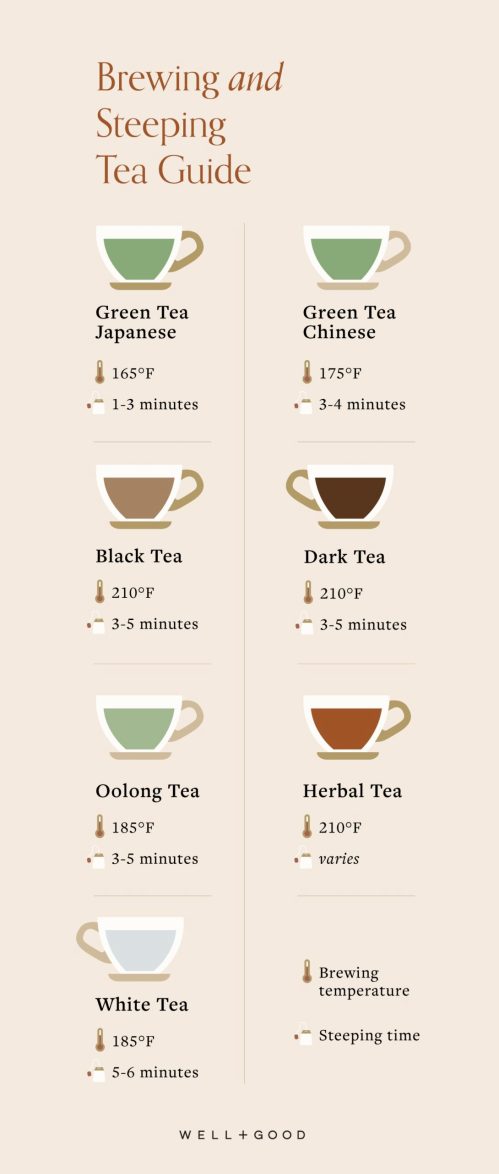Our editors independently select these products. Making a purchase through our links may earn Well+Good a commission
The Surprising Mistake You’re Making When Brewing Your Tea, According to a Certified Tea Specialist
Tea experts explain how long to steep tea and what the brewing temperatures should be for six different types of tea in this complete guide.

Even if you have tea every single day—and use a proper kettle, not the microwave—I’ve got news for you: You’re probably doing it wrong. Yes you, with the tea collection that takes over your entire pantry. When it comes to the art of tea making, here’s a little-known truth bomb: different varieties of tea not only require different steeping times, they require different water temperatures, too.
Experts in This Article
certified tea specialist and co-owner of The Cultured Cup in Dallas
Dallas-based registered dietitian and nutrition communications consultant
“The reason why brewing temperature matters is because some types of tea leaves are more delicate than others,” says Kyle Stewart, co-owner of The Cultured Cup and one of only 175 certified tea specialist in the entire world. Stewart explains that when it comes to how long to steep tea, the duration varies for a similar reason: some types of tea have a stronger flavor profile than others. But he says letting it steep too long ends up making the tea taste more bitter than it’s meant to.
“Often, people will leave their tea bag in their mug while they drink their tea thinking that this is making the tea stronger so they’re getting more of the benefits from the tea leaves or herbs, but that’s actually not the case,” says Neva Cochran, RD, a registered dietitian who is friends with Stewart and a knowledgable tea expert in her own right. “Scientists have actually studied this and found that at a certain point, the benefits you’re getting from the tea reaches a saturation point.”
Both Stewart and Cochran recommend brewing tea using either an infuser or tea bags. They aren’t fans of the commonly used tea ball strainers. “People inevitably pack the ball too full and the outer tea leaves get more water exposure than the inner leaves, so it isn’t even,” Stewart says. Whether you use tea bags or an infuser, both say that you can use a kitchen thermometer to check the water’s temperature. Or, if you’re really invested, you can buy an electric tea kettle that allows you to set the right temperature (like the Fellow Stagg EKG Electric Pour-Over Kettle, $150).
So…what is the correct tea temperature? If you fancy yourself a tea connoisseur, below is the info you need for each type of tea, including “tea” with herbs or flowers (like chamomile, cinnamon, or turmeric). Consider this your official tea guide.
Everything you need to know about how long to steep tea and the correct brewing temperature.

White tea
Brewing temperature: 185°F
Steeping time: 5 – 6 minutes
Stewart explains that white tea is made from leaves plucked straight from the Camellia sinensis plant; they haven’t been treated or oxidized (aka exposed to air to dry out) in any way. “White tea is the most delicate type of tea, so because of this, it needs to steep longer than other types of tea,” Cochran says. “It has a very mild taste, so it takes longer for its flavor to be brought out.”
Despite being delicate, Stewart says white tea is pretty forgiving when it comes to the brewing temperature. “It can withstand a wider range of temperatures than, say, green tea,” he says. “It’s very user-friendly.” Both experts recommend a brewing temperature of 185°F and a steeping time of about five minutes, but encourage experimenting to see what you like. “Some people like strong tea while others like it more mild, so I tell people that these are general recommendations and not hard and fast rules,” Stewart says. “Use the recommendation as a guideline and then go from there to see what you like best.”
Green tea
Brewing temperature: 165°F for Japanese green tea; 175°F for Chinese green tea
Steeping time: 1-3 minutes for Japanese green tea; 3-4 minutes for Chinese green tea
“Green tea is the problem child of the teas,” Stewart says, adding that it isn’t as forgiving as white tea. He explains that there are two types of green tea: Chinese green tea and Japanese green tea. “Chinese green tea—which is more widely available in the U.S.—is wok-fired, which is used to stop oxidation. Immediately after that, the leaves are shaped, which breaks the cells in the green tea leaves.” With Japanese tea, Stewart explains, the tea leaves are steamed, not wok-fired. “Japanese tea requires a lower brewing temperature and very little steeping time,” he says. (When it comes to matcha, he recommends a brewing temperature of 175°F.)
Does matcha have more health benefits than traditional green tea? Watch the video below to find out:
Oolong tea
Brewing temperature: 185°F
Steeping time: 3 – 5 minutes
“White tea isn’t oxidized at all, black tea is totally oxidized, and oolong tea is partially oxidized,” Cochran explains. “That’s why it’s that brown color.” While it’s partially oxidized, Stewart says there’s a wide range of how long the oxidation time actually is, which creates a wide variety of different types of oolong tea. “I call oolong ‘the wine of tea’ because of this,” he says, adding that some have floral notes while others taste more vegetal. “You can even [taste] notes of stone fruit, like grilled peach,” he says.
Because of the range of oolong teas, Stewart again recommends experimenting a little to figure out what you like the taste of best, for the type of oolong you’re making. But as a general guide, both experts recommend a brewing temperature of 185°F and a steeping time of three to five minutes.
Black tea
Brewing temperature: 210°F
Steeping time: 3 – 5 minutes
Darjeeling, English breakfast, Irish breakfast, and Earl Gray are all popular types of black tea and both experts say they require boiling water and a steeping time of between three to five minutes. “Black tea has a very assertive taste, which some people like and part of the reason why it’s thought of as a morning tea; it really wakes you up,” Stewart says. “Other people find that the assertiveness is too much, so they add a little milk or cream to tone it down.” Either way, he says this strong tea needs very hot water.
Dark tea
Brewing temperature: 210°F
Steeping time: 3-5 minutes
Dark tea is less common than the others, at least here in the States, and Stewart explains that it’s a type of fermented tea completely different from kombucha. “With dark tea, beneficial fungi and bacteria are part of the oxidation process which makes it good for the gut,” he explains. Expensive dark teas, he says, are aged and fermented up to 10 years.
To brew dark tea, Stewart says he first rinses the tea leaves with boiling water. Then he uses boiling water to brew it and lets it steep for three to five, the longest of all the teas. This sweet spot brings out it’s flavor the best, without veering over into being too bitter.
Herbal tea
Brewing temperature: 210°F
Steeping time: Varies
Even though they don’t come from the camellia sinensis plant, various flowers and herbs are also enjoyed as a tea because they’re full of beneficial health properties, including antioxidants. Since there’s such a wide range of flowers and herbs—which all taste completely different—both experts say it’s hard to give blanket instructions for them. But in general, they say if it’s a powder, brewing boiling water works best.
The steeping time completely depends on how strong of a flavor profile the flower or herb has. Something mild, like chamomile, will require a longer steeping time than one with a stronger taste, like ginger or turmeric.
Stewart reiterates that all the guidelines here should be considered just that, guidelines. “People have different preferences, so it’s important to figure out what you like best for yourself,” he says. But with these tips in mind, you’re ready to serve a proper cup to everyone, from your best friend to the Queen of England. Hey, you never know.
Have you checked out The Well+Good SHOP? Our editors sift through hundreds of products every week so that you don’t have to—and now, you can find their faves (from skin care to self care and beyond) in one carefully curated space. What’re you waiting for? Get shopping!
Sign Up for Our Daily Newsletter
Get all the latest in wellness, trends, food, fitness, beauty, and more delivered right to your inbox.
Got it, you've been added to our email list.










